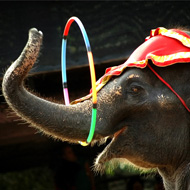Scotland’s ban on wild animals in circuses comes into force

“Having campaigned for many years to end the suffering of circus animals, we are thrilled that Scotland has taken action."
A ban on wild animals in circuses has come into force in Scotland, making it the first UK nation to introduce such legislation.
The Wild Animals in Travelling Circuses (Scotland) Act 2018 came into effect on 28 May, five months after the government bill was unanimously passed by MSPs.
Whilst there are currently no circuses with wild animals based in Scotland, they have visited from England in the past. The new legislation will prevent them from touring in the future.
Animal Defenders International (ADI) has welcomed the move and encouraged other UK nations to follow Scotland’s lead.
A Welsh ban was backed overwhelmingly in the Assembly during a debate in March, and a statement is expected before the summer break.
Meanwhile, a ban in England has been promised by successive governments for more than a decade. In February, the government indicated that a ban will be in place by January 2020.
ADI president Jan Creamer said: “Having campaigned for many years to end the suffering of circus animals, we are thrilled that Scotland has taken action. We now look to England, Wales and Northern Ireland to follow their lead and deliver the UK-wide legislation that the public have long wanted and the animals so desperately need.”



 The Veterinary Medicines Directorate (VMD) is inviting applications from veterinary students to attend a one-week extramural studies (EMS) placement in July 2026.
The Veterinary Medicines Directorate (VMD) is inviting applications from veterinary students to attend a one-week extramural studies (EMS) placement in July 2026.